Organization
National Council for the Blind, Malaysia (NCBM)
Location
The participants are in both Peninsular Malaysia and East Malaysia
Duration
February 2021 – May 2022
Target group
Persons with disabilities
A. Project design
a. Context and background
Advocacy for disability-inclusive digitalization has been limited. Each disability group has functioned in its own silo, with very limited cross-disability cooperation. Persons with disabilities in Malaysia are not able to access ICT on an equal basis with persons without disabilities. Malaysia does not have technical expertise in web accessibility or accessible publishing. This has resulted in a national famine of accessible, up-to-date information and knowledge materials that impacts Blind persons and persons with other print disabilities.
With the need for physical distancing, the COVID-19 pandemic has expanded online transactions. Those range from applying for financial aid, to purchasing daily necessities, and making healthcare-related appointments. There is an urgent need to catalyse the growth of digital skills for disability-inclusive website accessibility and accessible publishing.
Furthermore, the Government of Malaysia has demonstrated policy intent to promote inclusive digitalization, as evidenced by MyDIGITAL, the Malaysia Digital Economy Blueprint, the five-year National Fiberization and Connectivity Plan (NFCP), 2019-2023, and the 2018 National Seminar on the Implementation of the Marrakech Treaty to Facilitate Access to Published Works for Persons Who Are Blind, Visually Impaired, or Otherwise Print Disabled (hereinafter referred to as the Marrakech Treaty) as preparation for Malaysia to accede to the Treaty. Limited institutional expertise, with poor advocacy, has meant slow progress.
b. Objective and expected outputs
Objective: To facilitate disability-inclusive digitalization in the context of COVID-19 in Malaysia.
Outputs:
- Strengthened technical capability of persons with disabilities in digital accessibility and ICT skills, strategic advocacy and gender-disability intersectionalities;
- Strengthened evidence base of the situation of persons with disabilities, particularly women and girls with disabilities, during the COVID-19 pandemic and their access to ICT;
- Strengthened institutional capability of the Malaysian Government and OPDs in preparing for Malaysia’s accession to the Marrakech Treaty.
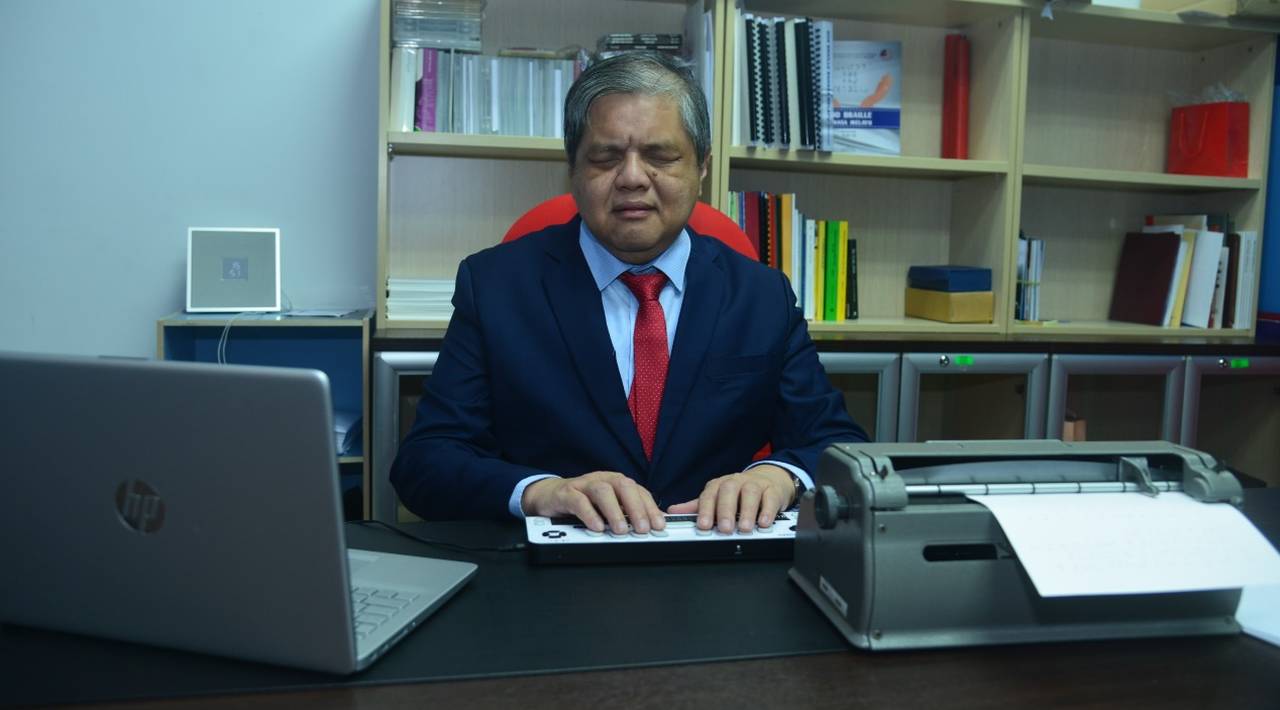
Wong Yoon Loong, Executive Director, National Council for the Blind, Malaysia, at work with Refreshable Braille device and computer notebook
c. Partnerships
NCBM built and strengthened partnerships with the following via activities under this project:
Training programme
- Organizations/groups of persons with disabilities, especially those outside of the blindness field, e.g., Malaysian Sign Language and Deaf Studies Association (MyBIM); Deaf Media and Technology Association; Sarawak Association for the Deaf; Boleh Space; Challenges Foundation; Association of Women Lawyers; and the Medico-Legal Society of Malaysia. Leaders/members joined as participants, sowing seeds for cross-disability and cross-sectoral advocacy and alliance building for more effective government policies.
Experts, including two former local government councillors with disabilities, from the following delivered substantive sessions:
- Disability-related entities: National Early Childhood Intervention Council, Malaysia; Malaysia Independent Living Association for Disabled; Muscular Dystrophy Association (Singapore); Women with Disabilities Australia; ZaSve (a business pod created and managed by a woman professional with disabilities).
- Local Government entity: Penang Accessibility and Awareness Group, under the Penang State Executive Council, Malaysia.
- Staff of United Nations entities: ESCAP; ITU Regional Office for Asia and the Pacific; UNICEF Malaysia (woman expert with disabilities).
Research
- Four Malaysian Universities: Albukhary International University; International Islamic University Malaysia; Quest International University; and Taylor’s University - student volunteers, guided by their lecturers, contacted and interviewed respondents with disabilities.
Policy development
- The Intellectual Property Corporation of Malaysia (MyIPO) engaged NCBM in substantive consultations that supported amendments to the Copyright Act 1987. Parliament enacted (15 December 2021) the Copyright (Amendment) Act 2021. NCBM provided consistent technical support to concerned government officials on this matter through to Malaysia’s accession (31 March 2022).
B. Achievements and lessons learned
a. Impact and results
Training outcomes
Digital accessibility and ICT skills: A total of 23 participants (10 women and 13 men) completed digital accessibility training in conducting website accessibility audits, and accessible publishing training in producing documents in accessible formats. This was the first such training conducted in Malaysia for persons with diverse disabilities and allies in disability work. The Guidelines for Accessible Publishing emanated from the training of the Malaysian participants.
Gender-disability intersectionalities: All participants in digital accessibility training and accessible publishing training attended the training in gender-disability intersectionalities. There were 15 additional participants. This was the first such training conducted in Malaysia that addressed the nexus between gender equality and disability justice. The impact was discernible in heightened gender sensitivity in group discussions and group exercises. Women participants began to interact more, increasingly assuming more responsibility for group tasks, as their confidence levels rose. Group work and plenary presentations gave women participants a safe space to practise articulation on policy issues.
Strategic advocacy: The strategic advocacy training also benefitted participants who did not attend digital accessibility training. For most participants, it was the first experience of learning and discussing together, in a cross-disability setting, issues of common concern as persons with disabilities. Participants were guided on the application of techniques for analysing issues identified, towards addressing concerns. As part of the learning-by-doing thrust of the NCBM training programme, participants were encouraged to seize opportunities to hone their advocacy skills. In this regard, together with NCBM’s own advocacy for disability-inclusive digital accessibility, participants engaged in or co-organized around 10 events.
As a concluding activity of the strategic advocacy training programme, NCBM supported the participants in creating awareness among government officials on the importance of making the accessibility of government websites and publications disability-inclusive for persons who are visually impaired or otherwise print-disabled. Officials from 19 government entities attended the Malaysian Seminar on Disability-Inclusive Digital Accessibility for Blind Persons and Persons Who are Otherwise Print Disabled, held in Kuala Lumpur on 31 May 2022 and streamed live via Facebook and Zoom. It is noteworthy that, further to NCBM efforts to engage with the banking sector on improving the disability inclusion of online banking and other services, officials from both the central bank (Bank Negara Malaysia) and the private sector (MayBank) attended the Seminar.
The participants have emerged with direct experience of a new sense of cross-disability goodwill and bonding. This is of particular significance in pointing the way out of a social landscape fractured by silo mentality and behaviour, and disempowerment rooted in ableism, both internalized and lateral. The training experience has demonstrated the value of collaboration in complementing each other’s strengths and limitations for more effective self-advocacy and self-help.
The new understanding and consciousness are a fresh foundation for mutual support among persons with diverse disabilities to plug gaps in effective advocacy and self-representation. The participants have potential to grow stronger in supporting follow-up to Malaysia’s accession to the Marrakesh Treaty, advocacy for harmonization of domestic legislation with the CRPD, and disability inclusion in SDG-related actions.
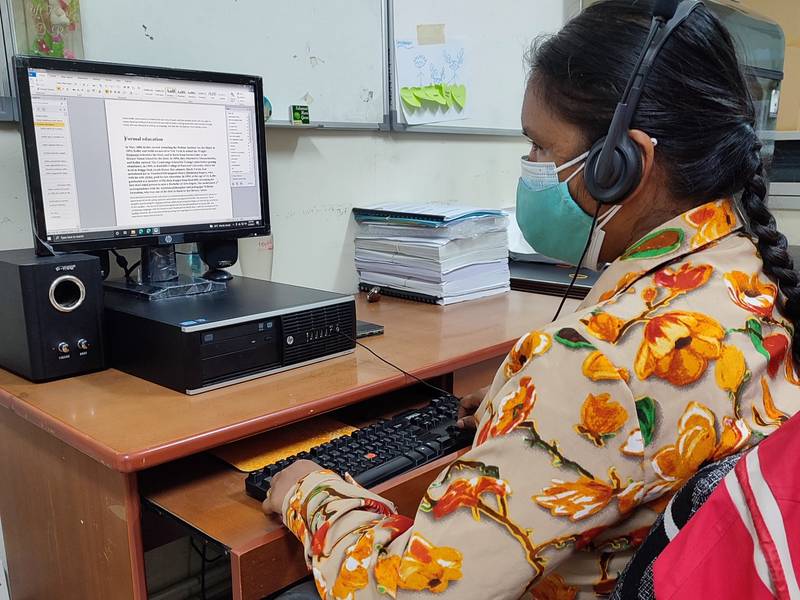
Umashangari Selvamani, Braille editor, keen on accessible publishing
Research outcomes
A questionnaire survey (in Malay, English, Chinese and Malaysian Sign Language) was conducted to ascertain the situation of persons with disabilities. The study (Situation of Persons with Disabilities in the COVID-19 Pandemic and Access to ICT, with a special focus on Women and Girls with Disabilities), the first of its kind in Malaysia, collected a robust sample from a wide range of persons with disabilities.
Overall, the challenges, including ICT ones, experienced by women and girls with disabilities during the pandemic and lockdowns were very similar to those faced by men and boys. Half of the respondents had difficulty with access to information about COVID-19 and would have benefited from disability-inclusive communication. The majority (94.9 per cent) struggled with negative emotional or psychological symptoms and had to deal with them on their own.
In addition, two focus group discussions were conducted (20 and 21 March 2022) via Zoom with women with disabilities from diverse backgrounds. All research participants shared that the COVID-19 pandemic and the consequent lockdowns had had a major impact on their lives. Decision-making on most actions had to consider government COVID-related standard operating procedures for public health. Some welcomed the push to acquire new knowledge and skills and attempt new pursuits. Others faced difficulty in getting help and from the extended restrictions on freedom of movement. Persisting challenges, such as the lack of accessible public transportation and of accessible communication, had multiplier effects under pandemic conditions. Some participants faced difficulty in securing approval of flexibility in remote working arrangements.
Policy outcomes
The most significant policy outcome of this project arose from NCBM strategic advocacy for Malaysia’s accession to the Marrakesh Treaty, with accession paving the way for the removal of barriers to the availability of accessible published works for Blind persons and persons with other print disabilities.
The project generated for the consideration of the Government of Malaysia two complementary knowledge products, to support disability-inclusive implementation of MyDigital, the SDGs and the Incheon Strategy to “Make the Right Real” for Persons with Disabilities in Asia and the Pacific, as well as post-accession implementation of the Marrakesh Treaty: 23 detailed policy recommendations, and key elements of a roadmap for advancing towards disability-inclusive digital accessibility.
NCBM issued press statements urging the Government to accede to the Marrakesh Treaty. NCBM also secured the support of Senator Datuk Ras Adiba Radzi as the representative of persons with disabilities in the Parliament of Malaysia who urged intensification of efforts towards Malaysia’s accession to the Marrakesh Treaty.
NCBM was consulted by MyIPO in its negotiations with the Attorney-General’s Chambers of Malaysia and its overall efforts in the proposed amendments to the Copyright Act 1987. NCBM continuously provided information to MyIPO to support its preparation of documentation required by the Attorney-General’s Chambers which the Cabinet approved for tabling in Parliament. Consequently, the Copyright (Amendment) Act 2021 was gazetted on 10 February 2022. NCBM experience is documented in The MARRAKESH TREATY: A 5-STEP CSO ACTION GUIDE with Insights from Seeding the “Miracle of Marrakesh:” The Journey of Malaysia’s Accession to the Marrakesh Treaty ~ Civil Society Organization Perspective.
Women participants are playing a more active advocacy role in tackling emerging policy issues. Today, women participants with disabilities increasingly question webinar organizers regarding Blind persons’ access to posters shared on social media and the availability of access to BIM interpretation --- not necessarily for themselves, but as a matter of principle. During the period of project implementation, and in follow-up to gender-disability intersectionalities training, two women participants with disabilities were included, for the first time, in the Women’s Cluster of Malaysia’s mainstream Civil Society Organization (CSO) Platform for Reform (CSOP4R). This enabled the inclusion of the perspectives of women with disabilities in mainstream policy documentation drafted by the CSO Platform for government attention.
Furthermore, three Deaf participants played key roles in producing an online Malaysian Sign Language (Bahasa Isyarat Malaysia (BIM)) advocacy event (Empowering Deaf Women in Malaysia through Sign Poetry) that promoted, in the public domain, BIM awareness and BIM poetry as part of strengthening Malaysian Deaf identity and culture.
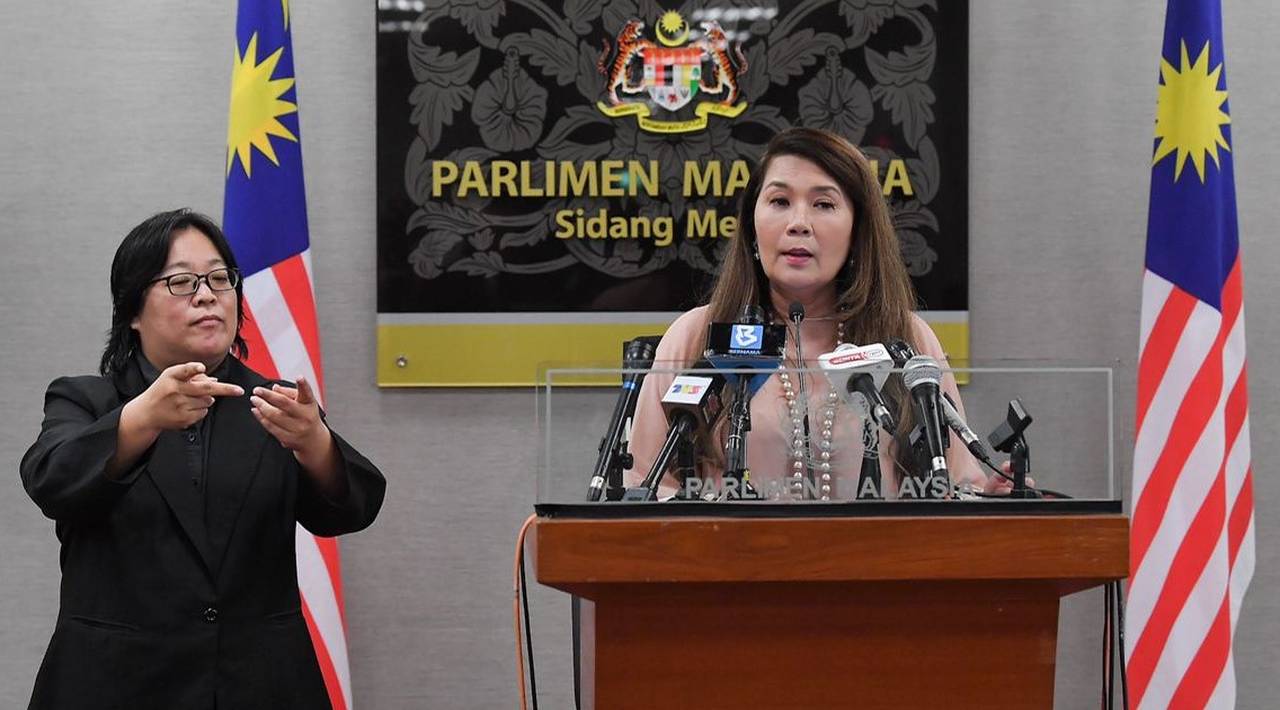
Senator Datuk Ras Adiba Radzi, adding her voice to urging intensification of efforts towards Malaysia’s accession to the Marrakesh Treaty
b. Challenges
Training programme
Despite NCBM’s well-established organizational contacts, the first challenge was the identification of suitable candidates from diverse disability groups. The main organization of persons with physical disabilities did not respond to any approaches made. It was particularly difficult to find representation from the Deaf community - no Deaf candidates were forthcoming from the nationwide networks of Deaf persons’ organizations, despite numerous attempts. Persistence in expanding the search beyond organizational contacts to media coverage and webinars yielded the breakthrough. Academic staff with disabilities helped in identifying university students with disabilities as candidates.
The participants’ levels of ICT and conceptual understanding varied widely. NCBM organized a foundation course to bring everyone up to speed on ICT fundamentals. Participants were initially hesitant to interact in digital accessibility sessions. The pedagogic method was quickly adjusted to lower the anxiety level of the participants: the trainer demonstrated key points, via screen sharing and direct engagement with individual participants. This encouraged more interaction. The digital accessibility training team was impressed by the relatively consistent attendance level of the participants. Moreover, all participants were constantly urged to do their exercises, to “learn-by-doing.” A supportive, non-judgemental learning ambience was fostered. Participants increasingly helped each other in finding solutions.
The participants were located in various parts of Malaysia, even in remote, rural areas. COVID-19 challenged training methods. With all sessions held online, the instability of Internet connectivity and its uneven coverage across the country posed serious issues. Online learning required quality video and audio access; the premium data plans for that were beyond the budgets of most participants. In-session learning was interrupted when poor connectivity forced participants to drop off and they had to repeatedly attempt to sign in. When it rained heavily, some participants could not sign in at all. This was a recurrent issue.
In addition to Malaysian Sign Language, Zoom captioning was enabled. However, almost none of the participants and resource persons/facilitators was a native English speaker. Zoom captioning was not yet sophisticated enough for text accuracy when speech deviated considerably from North American English. Even if Zoom captioning did not yield as many substantive errors, it might still have been a challenge for some participants to grasp the key messages conveyed in all the sessions. Participants who needed more help in English-language communication were privately contacted and given links for free online self-learning.
Research
Data gathering via a questionnaire survey was a huge challenge. The English original of the questionnaire was translated into Malay and Chinese to broaden access. In recognition of the need of many Deaf persons for questions to be posed to them in their own language (BIM), a set of 59 short videos was produced to help potential respondents understand the questions posed. In addition, Deaf persons were identified and trained to conduct the interviews.
NCBM identified hundreds of Blind persons as potential interviewees. Student volunteers were mobilized to conduct phone interviews and to assist respondents with disabilities in completing questionnaires. With the surge in phone scamming during the pandemic, many who were contacted by the volunteers were too nervous to proceed, although the volunteer support was helpful for respondents.
Online completion of the questionnaire required persistence. Each time an unstable WIFI connection disrupted an online response, the respondent (or the volunteer assisting the respondent) would have to re-start from the beginning. There were over 100 incomplete responses.
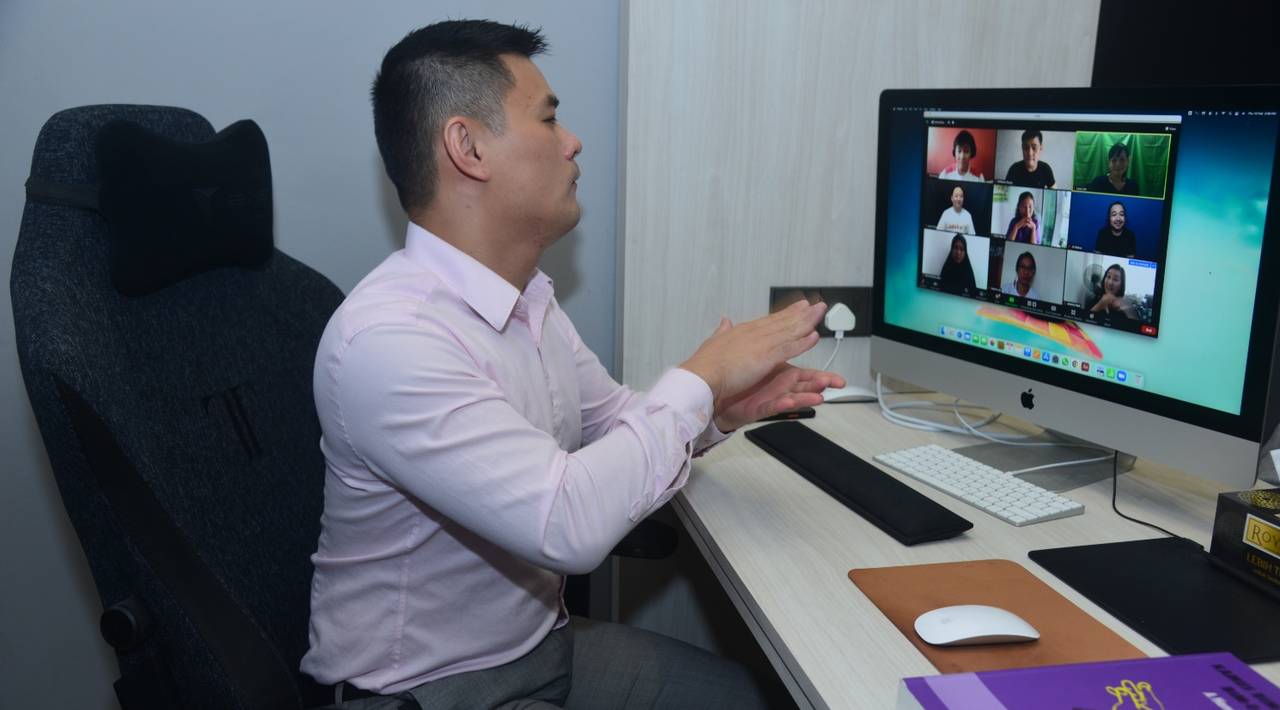
Anthony Chong in online training session, signing BIM
c. Sustainability
Training programme
NCBM maintains contact with the participants of the training programme via WhatsApp chat groups. Information related to training topics (e.g., via reference materials, webinars, events involving participants/resource persons who had delivered training programme sessions) continues to be shared by NCBM and by participants themselves, to reinforce and advance learning. The chat groups are an important means of keeping alive the gender-sensitive, cross-disability bonding and mutual support fostered over the course of the NCBM training programme.
Some participants with diverse disabilities have started to collaborate in designing a prototype training programme directed at officials of the Ministry of Health and ProtectHealth (a wholly-owned subsidiary of the Ministry of Health), to provide them with a basic guide to disability-inclusive digital information sharing. The insights gained through this initiative may be used to refine the prototype and the strategy for working with other Ministries towards improving the digital accessibility of online information, application forms and feedback mechanisms directed at the general public. Another participant is involved with a local university in developing an app to facilitate Deaf access to telehealth services; the app potentially could also benefit older persons and other disability groups. Yet another has been appointed to head the ICT Department of a large local foundation.
NCBM follow-up plans include: (1) facilitating the participants’ sharing of their knowledge and skills in accessible publishing and website auditing; (2) conducting more accessibility audits of government websites, and training for government website developers on WCAG compliance.
Some participants initiated the formation of a Persons with Disabilities Cluster that was missing from Malaysia’s mainstream civil society platform for institutional and policy reform, CSOP4R. The platform is composed of 102 major CSOs in 17 thematic clusters, but there was none on persons with disabilities until the NCBM participants advocated for its establishment.
Policy development
On post-accession implementation of the Marrakesh Treaty, NCBM will continue to support MyIPO and other concerned government entities regarding the following:
- Formally appoint the Authorized Entity to manage the exchange of accessible publications under the Marrakesh Treaty;
- Establish the Malaysian Marrakesh Treaty Task Force;
- Develop a roadmap for the implementation of the Marrakesh Treaty in Malaysia.
NCBM has developed key elements of the proposed roadmap (2022-2030), as contained in The MARRAKESH TREATY: A 5-STEP CSO ACTION GUIDE, produced under the ESCAP-supported NCBM project.
Further to website accessibility audits conducted in the course of the project, NCBM has an evidence base for the development of policy on achieving the disability-inclusive accessibility of government websites, in compliance with WCAG.
d. Good practices and lessons learned
Practices and lessons learned from the training programme, a pioneer endeavour under COVID-19 pandemic conditions, are summarized below:
Selection of project participants
Tenacious persistence was required for identifying prospective participants not only via more easily available methods (contacts with well-known national CSOs that are long-established in the disability field), but also by attempting avenues that had not been tried before, to reach less well-known groups of persons with disabilities, e.g., by scouring local online media items and webinars.
Despite wide dissemination of information to organizations of persons with disabilities using all means available to NCBM, it proved tremendously difficult to get nominations from some of the better-known CSOs. One view is that poor responses could have been indicative of limited understanding and appreciation of the value of the training offered or a reluctance/inability (for whatever reason) to make the extra effort required to identify candidates from among the membership or constituent groups. It could also be that the office bearers contacted simply had no contact with members and no viable system existed for communicating with them.
It would appear that capability development among the decision-makers and management executives of organizations of persons with disabilities is a real need. There also appears to be a dire need to raise, among persons with disabilities, the literacy level (especially in a broad sense, e.g., ICT literacy, legal literacy, and financial literacy), as well as the level of understanding of social and economic issues, and policy matters.
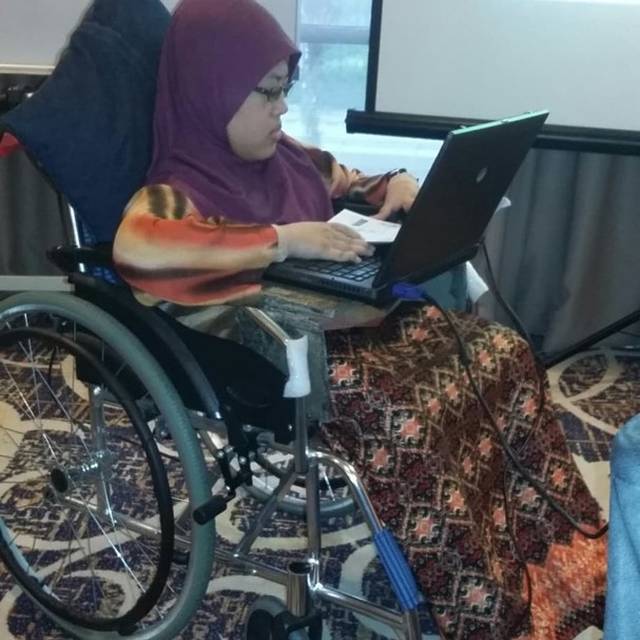
Siti Hawa, Ph.D student, Universiti Malaysia Pahang (UMP), juggling NCBM training sessions, UMP Disability Club duties, and Ph.D research
Provision of reasonable accommodation and other support
NCBM introduced, into online sessions, reasonable accommodation for a participant with extensive disabilities and high support needs, demonstrating respect in practice for CRPD principles: after the first hour, there was a 10-minute rest break for everyone. In addition, NCBM also went to considerable lengths to ensure that Malaysian Sign Language (BIM) interpreting service was available for every session. For each session, NCBM engaged two BIM interpreters. Often three and occasionally four BIM interpreters joined to observe.
NCBM organized, with local training resources, a foundation course prior to launching the digital accessibility training programme, to help candidates with lower ICT competency levels approximate the baseline common minimum competency level for all participants.
Subject to resource availability, in addition to the foundation course in digital accessibility, it might be helpful to provide a foundation course in key concepts and phrases used for the training programme. Some terms, e.g., Deaf culture, require explanation with the use of local examples. Furthermore, also depending on resource availability, the training programme could be divided into three levels for consecutive delivery: I. Basic. II. Intermediate. III. Advanced.
To help participants fearful of making mistakes in practical exercises, the trainers demonstrated that assignments were doable via screen sharing, as well as step-by-step engagement with, and eliciting responses from, participants during online sessions. Working together in auditing the same Malaysian website was helpful.
Since project activities were all implemented online, NCBM depended on parameters that were beyond its control: broadband coverage and Internet connectivity limitations were insurmountable ICT infrastructure issues. At the outset, participants were asked to revert to NCBM on their respective Internet service providers and data plans, if they encountered connectivity issues. In all cases, the participants proceeded with the data plans that they had. Under inclement weather conditions, there were frequent instances of participants losing their WIFI connectivity.
For future online training, there is a need for budgetary provision to address inequitable access to essential conditions for online learning: data plans and devices sufficient for online learning to cover the duration of training and immediate follow-up. The challenge remains of supporting participants in remote areas with poor Internet coverage. Making available data plans and smart devices that are easily affordable by the vast majority of persons with disabilities is a policy issue for advocacy.
Enhancement of cross-disability bonding
Sighted participants who had hitherto taken web accessibility for granted found the web accessibility training to be “an eye-opener.” Despite everyone having learned the basics of coding and compliance with web accessibility standards, it was the active engagement of Blind persons, in collaboration with Deaf persons and/or persons with physical disabilities, that yielded better results in group assignments. Such cross-disability collaboration, built on pooling strengths and neutralizing each other’s limitations, could form the unique foundation of a strong partnership in the long road ahead for disability-inclusive digital accessibility.
NCBM’s approach from the outset (foster bonding via small group formation and encouraging mutual support among participants) worked well. The participants were all occupied during the work week with full-time pursuits (e.g., income-earning work, studying, care duties). Except for the one-week foundation course on digital accessibility, training sessions were held on two work day evenings and on weekend afternoons. Although some participants could not understand everything imparted and everyone had competing commitments, overall attendance was good. Indeed, the DAISY Consortium trainers, with global experience of training developing country participants, were impressed by the Malaysian participants’ attendance.
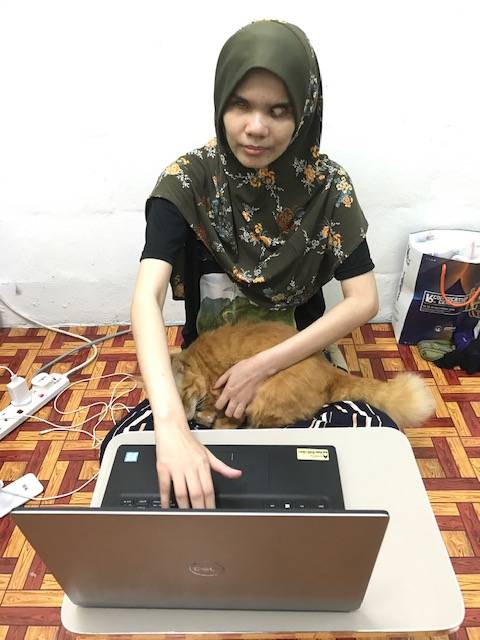
Alfa Nur Aini Ermam Effendi, co-hosting Zoom online training from her room at home
C. Feedback and resources
a. Voices of participants
“I joined the NCBM training programme on digital accessibility, which enabled me to also attend sessions on gender-disability intersectionalities and strategic advocacy. I participated in the programme for its entire duration from June 2021 until January 2022.
Through this Programme, I am now more aware of the importance of web accessibility, not only for Blind persons, but also for persons with other disabilities. Apart from that, I have more understanding of the needs of persons with other disabilities. The NCBM training sessions enabled me to meet new people beyond the Blind community. I have learned to work with persons with diverse disabilities.
With this team work, and the sharing sessions, I have realized that I am not alone in facing whatever challenges that I come across in this life. We share opinions, and we advise each other on how to overcome the challenges in our lives. I thank the NCBM team for organizing these wonderful training sessions on disability-inclusive digital accessibility, gender-disability intersectionalities and strategic advocacy.”
----Sun Wan Ting, postgraduate student in Master’s in Special Education, Universiti Malaysia Sarawak, Kuching, Sarawak, East Malaysia
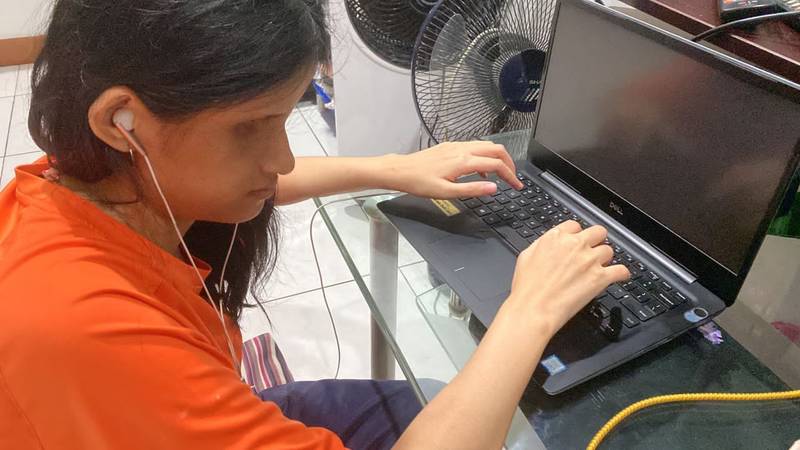
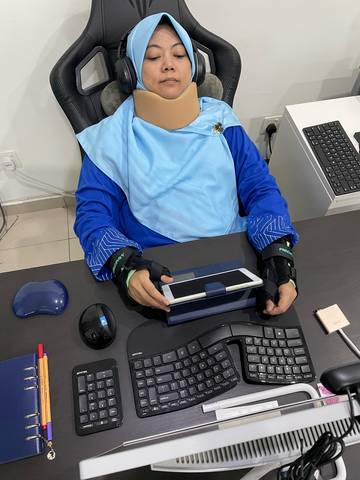
“I was a computer programmer who spent long hours at the computer, clacking away on the keyboard and clicking away on the mouse. Since becoming disabled about 10 years ago, I have had to change my profession. Sometimes, severe relapses caused me to be bedbound. I needed rehabilitation to regain some mobility. My threshold was about 30 minutes. Not taking breaks after 30 minutes of sitting up meant unbearable pain and weakness.
Sometimes I need to wear a neck brace to help support my weak neck muscles. I use wrist splints to reduce carpal tunnel pain, a special ergonomic keyboard and mouse, and a tablet to work while lying down. Still, these did not help much. Even browsing the Internet while using the ergonomic mouse required me to sit up at the PC. To use the tablet, I still had to hold my head up. This again meant frequent breaks. I loved reading, but could no longer hold books.
Then, I discovered my phone could read aloud what was displayed on the screen. I learned to use the Non-Visual Desktop Access (NVDA), an open-source, portable screen reader. My Blind peers in the NCBM Training Programme are expert screen reader users and familiar with digital accessibility needs; their practical insights and tips helped the rest of us sighted persons.
With the NVDA installed, the keyboard shortcuts freed me, a sighted user, from having to rely on the mouse. That’s a total game changer. Now, I can read and work without needing to look at the monitor or screen all the time. I can even surf the Internet, as long as the websites that I visit are accessible (WCAG 2.1 compliant).
Making sure websites are WCAG 2.1 compliant enables digital access not just for Blind persons, but also for persons with mobility issues like me and many other persons with diverse disabilities, to remotely access and use information in rapidly digitalizing Malaysia. Disability-inclusive digital accessibility is essential, especially for rapidly ageing societies.”
---Yana Karim: Remote access and disability-inclusive digital accessibility ~ perspective of a person with a chronic illness and physical disabilities
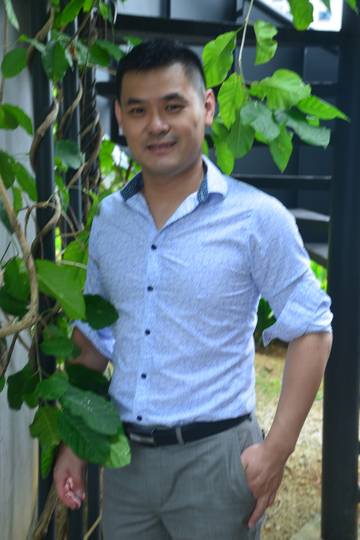
“The disability-inclusive digital accessibility training programme was an eye-opener. I learned that it is not enough to just have websites and PDF documents – those must be developed in specific ways, according to established standards, to enable accessibility for Blind persons and persons with other print disabilities, such as persons with dyslexia. Now, with the knowledge and technical skills acquired from NCBM training, we are in a stronger position to contribute to Malaysian progress in digital accessibility.
The NCBM training programme helped me to understand better what OKU (orang kurang upaya - Malaysian national language equivalent of persons with disabilities) advocates have been and are working for in the OKU community. Through participating in the programme, I have realized that the Deaf community does not have similarly rich information and resources for effective advocacy. Little wonder that Deaf people are struggling to find a place in mainstream society, even 25 years after Deaf CSOs were first established in Malaysia. Besides that, I have benefitted from other useful insights. For example, I have learned to search for common ground and synergies to build on, not naively to just stick with consideration of what is best for the Deaf community. This is because most people still do not understand us well enough; we need to address that issue.
I learned a lot about gender-disability intersectionalities. I was inspired to work on a Deaf women’s empowerment project. I developed a proposal and it was accepted by the British Council for funding support. Its implementation was challenging: it took us out of our comfort zones to explore creative expression, through Malaysian Sign Language (BIM) poetry, of deeply buried feelings around personal experiences of social issues. The successful performances on 26 February and 26 March 2022 were gratifying for all of us involved in their creation.
Overall, the NCBM training programme has given my peers and me a lot of benefits, especially those of us who want to work in advocacy. It has opened our eyes to what has not been done and what has been done for and by the OKU community. It is good to have our knowledge “refreshed” and “updated” from time to time. It helps us to digest information, and to develop new and deeper understanding. For that, we need time to practise, reflect, share, learn. Move forward together. Be stronger together.”
---Anthony Alexander Vee Yee Chong (Ph.D), Deaf advocate, Malaysian Sign Language (BIM) researcher, educator, BIM facilitator and BIM poet
b. Resources
Publications
-
Amar-Singh HSS, Lai-Thin Ng, Moses Choo, Yoon Loong Wong, and Yuenwah San (2022). Situation of Persons with Disabilities in the COVID-19 Pandemic and Access to ICT, with a special focus on Women and Girls with Disabilities. NCBM, Kuala Lumpur.
-
Yuenwah San (2022). The MARRAKESH TREATY: A 5-STEP CSO ACTION GUIDE with Insights from Seeding the “Miracle of Marrakesh:” The Journey of Malaysia’s Accession to the Marrakesh Treaty ~ Civil Society Organization Perspective. The OKU Rights Matter Project 2022.
- Accessible pdf: https://okurightsmatter.com/wp-content/uploads/2023/10/Marrakesh-Treaty-Guide_167933.pdf
- Word: https://view.officeapps.live.com/op/view.aspx?src=https%3A%2F%2Fokurightsmatter.com%2Fwp-content%2Fuploads%2F2023%2F10%2FMarrakesh-Treaty-Guide_167933.docx&wdOrigin=BROWSELINK
https://okurightsmatter.com/digital-and-information-accessibility/
-
Prashant Verma (2022). Guidelines for Accessible Publishing. NCBM, Kuala Lumpur.
Press statements regarding the Marrakesh Treaty
English
- NCBM celebrates CNY with first-ever online music concert https://www.thestar.com.my/news/nation/2021/02/13/ncbm-celebrates-cny-with-first-ever-online-music-concert
- Supporting Braille systems https://www.thestar.com.my/opinion/letters/2022/01/03/supporting-braille-systems
- Marrakesh Treaty will enhance access to info for the blind – activists https://www.malaysiakini.com/news/557502
-
Marrakesh treaty: MYIPO urged to intensify efforts towards Malaysia’s accession -Ras Adiba https://www.thesundaily.my/local/marrakesh-treaty-myipo-urged-to-intensify-efforts-towards-malaysia-s-accession-ras-adiba-LL6692850
- Copyright and fair use during pandemic https://www.nst.com.my/opinion/letters/2020/12/646259/copyright-and-fair-use-during-pandemic
- Getting more books for the blind https://www.nst.com.my/opinion/letters/2020/01/559994/getting-more-books-blind
- Dewan Negara approves three more Bills under Domestic Trade Ministry https://www.malaymail.com/news/malaysia/2021/12/22/dewan-negara-approves-three-more-bills-under-domestic-trade-ministry/2030390
- Dewan Rakyat passes Copyright (Amendment) Bill, Geographical Indications Bill https://www.malaymail.com/news/malaysia/2021/12/15/dewan-rakyat-passes-copyright-amendment-bill-geographical-indications-bill/2028708
- Onus on govt to ensure digital inclusion for persons with disabilities: NCBM https://www.thevibes.com/articles/news/27823/Onus-on-govt-to-ensure-digital-inclusion-for-persons-with-disabilities-NCBM
- World Braille Day: Malaysia on track to making information accessible https://www.thevibes.com/articles/lifestyles/51204/world-braille-day-malaysia-on-track-to-making-information-accessible
-
Call for all parties to ensure information on cybersecurity reaches PwD, elderly: https://www.bernama.com/en/general/news.php?id=2084208
-
The Sun Daily (16 December 2021). Dewan Rakyat passes Copyright (Amendment) Bill: https://www.thesundaily.my/local/dewan-rakyat-passes-copyright-amendment-bill-NA8662197
-
Malaysia's Accession to the Budapest and Marrakesh Treaties, 31 March 2022: https://www.kln.gov.my/web/che_geneva/news-from-mission/-/blogs/malaysia-s-accesion-to-the-budapest-and-marrakesh-treaties-31-march-2022;
-
Malaysia Joins WIPO’s Budapest and Marrakesh Treaties, 31 March 2022: https://www.youtube.com/watch?v=SCnnTvk7PTg
-
Malaysia accedes to Budapest, Marrakesh treaties: http://prn.bernama.com/melaka/news.php?c=&id=2067966;
https://www.thestar.com.my/news/nation/2022/04/01/malaysia-accedes-to-budapest-marrakesh-treaties
Malay (Malaysian national language)
- Sistem Braille, Perjanjian Marrakesh Terus Perkasa OKU Penglihatan https://www.bernama.com/bm/rencana/news.php?id=2040056
- Perjanjian Marrakesh: Tingkat akses maklumat OKU penglihatan https://www.astroawani.com/gaya-hidup/perjanjian-marrakesh-tingkat-akses-maklumat-oku-penglihatan-275921
- Perhebatkan usaha ke arah penyertaan Malaysia dalam Perjanjian Marrakesh - Ras Adiba https://www.astroawani.com/berita-malaysia/perhebatkan-usaha-ke-arah-penyertaan-malaysia-dalam-perjanjian-marrakesh-ras-adiba-282802
- RUU beri perlindungan hak cipta automatik diluluskan https://www.bharian.com.my/berita/nasional/2021/12/899421/ruu-beri-perlindungan-hak-cipta-automatik-diluluskan
Others
- Empowering deaf women in Malaysia through sign poetry - follow-up to gender-disability internationalities training https://www.thevibes.com/articles/lifestyles/55049/empowering-deaf-women-in-malaysia-through-sign-poetry
- Two-hour, inaugural BIM Poetry Deaf cultural event entitled “Empowering Deaf Women in Malaysia through Sign Poetry” live streamed on 26 February 2022 https://youtu.be/Amrx1TUPn5c
- Presentation at ESCAP’s Regional Forum on Advancing Disability-Inclusive Development: Leadership and Participation of Persons with Disabilities toward an Inclusive, Accessible and Sustainable Post-COVID-19 World https://www.unescap.org/events/2021/regional-forum-advancing-disability-inclusive-development-leadership-and-participation#
- Ras Adiba cadang Malaysia serah laporan awal berkaitan CRPD kepada PBB Bernama, 5 May 2022: https://www.bernama.com/bm/news.php?id=2078225






